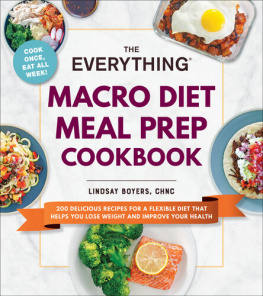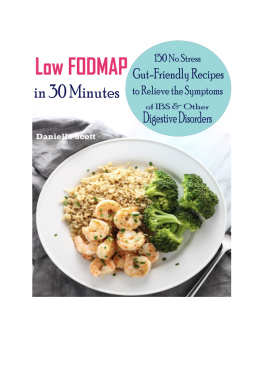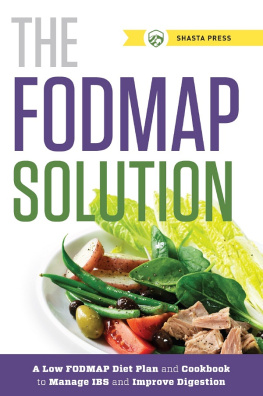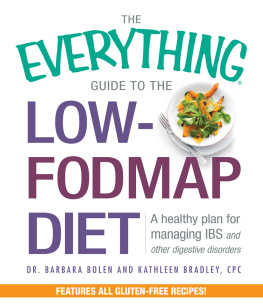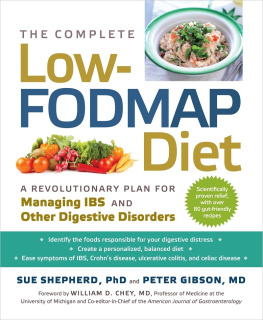HEALTHY GUT, FLAT STOMACH
THE FAST AND EASY LOW-FODMAP DIET PLAN
Danielle Capalino, MSPH, RD

Note
The information in this book is not intended to provide medical advice or to diagnose or treat medical diseases. It is strictly for informational purposes. Before undertaking any course of treatment, you should seek the advice of a doctor or health-care provider. I strongly encourage working with a dietitian who is trained in the low-FODMAP diet. If you are experiencing consistent or severe GI symptoms, you should first seek out medical attention to rule out other diagnoses.
If you are experiencing bleeding, symptoms that wake you up from sleep at night, symptoms that have changed dramatically or started suddenly, have had unintentional weight loss of more than 10 pounds, fever, or have a strong family history of colon cancer, seek the counsel of a medical professional before you embark on this diet plan.
All the information provided in this book regarding FODMAP content of foods is based on research that has been conducted at Monash University. All the information is accurate at the time of writing, but is subject to change as this is an emerging field. The recipes I have included use low-FODMAP ingredients, but have not been tested in a laboratory setting.
CONTENTS

Digestive woes are incredibly common. Up to one in five people suffer from these issueseverything from gas to constipation, bloating to stomachaches. Trying to figure out the cause can be so difficult that you give up in frustration. Most of the time the doctor doesnt even know what to tell you to do. Maybe you drink a tea that your mother suggested, or take a probiotic supplement you read about online. Or you may think you are sensitive to gluten. Sometimes you feel that you might be lactose intolerant, but other days you arent sure.
Well, if you think it has something to do with what youre eating, youre probably right. The good news is that there actually is a scientifically proven, research-based diet that will reduce the bloat and alleviate uncomfortable abdominal symptoms. It has worked for a number of my patients, and it will work for you. Im going to show you how, step by step, to determine what foods bother your gut, and help you create a personalized program of eating that makes you feeland lookgreat.
Im a nutritionist with a private practice in Manhattan, and Ive carved out a space teaching this groundbreaking approach to food to my patients. I wish I had a better name for it, but its known as the low-FODMAP diet.
The F-what diet? Im sorry, I didnt invent the name. I dont really like it, either, but its making its mark in the medical field and we should keep using it so everyone is on the same page. FODMAP is actually an acronym for a group of carbohydrates that are also impossible to pronounce or rememberbut all of which have the potential to wreak havoc on your gut:
Fermentable
Oligosaccharides
Disaccharides
Monosaccharides
and
Polyols
Because they are broken down so slowly, these short chain carbohydrates (or sugarssaccharide means sugar, and sugar is built out of carbohydrates) are poorly absorbed in the small intestine. While they are hanging out in your gut, they act as fast food for the healthy bacteria that live there. What I mean by this is that healthy bacteriawhich we want to nourishbreak down these sugars, producing hydrogen, carbon dioxide, and methane gases, which cause bloating and discomfort.
While everyone has a hard time digesting these foods, some individuals are more sensitive than others and as a result can experience a slew of gastroenterological symptoms, such as gas, bloating, diarrhea, and constipation. This is especially true in the millions of people with irritable bowel syndrome (IBSmore on that later) and those with food intolerances and other digestive diseases. Studies show that up to 75 percent of IBS sufferers find relief when following a low-FODMAP diet.
FODMAPs are not bad for you; they are foods that you were eating before and many of them are actually very healthy! So, why should you stop eating themat least temporarily? Because, although these foods can be packed with nutrients, they can also cause uncomfortable symptoms in your gut. The only way to figure out which foods are causing you trouble is to remove all of them from your diet and then reintroduce them one by one to find out which are to blame.
The foods that fall into each of the FODMAP categories are not very intuitive, so you do have to pay close attention to the lists I provideand I make it as straightforward as possible. Once you get the hang of it and know what to do on your own, you will be able to use this book as an occasional reference.
FODMAPs are not necessarily bad for you; many of them are actually very healthy.
One of the best things about this book is that you are going to end up with a diet that is personalized for you. You read that right: not everyone who reads this book needs to follow the same exact diet, but the same approach will help you identify your personal triggers and charge forward with a diet that works for you, and makes you look and feel great.
In the pages that follow I am going to:
Explain what the low-FODMAP diet is and why it is useful
Provide you with an elimination diet and the tools you need to test which foods give you the most trouble
Share great-tasting, simple recipes that are low in FODMAPs
Give you strategies for eating out and grocery shopping
Before I get to the nitty-gritty, let me tell you about me, and why I want to be your partner through this life-changing diet plan.
MY STORY
Why did I decide to focus my practice on digestive health? When you are superpassionate about nutrition, it makes sense to look at the coreto ask, Where does food go? The answer, of course, is, To your gut.
I love to feel empowered by making choices to make myself feel better. I have a history of severe joint problems and inflammation. When I was 23 years old, I started seeing doctor after doctor to address severe shoulder pain. After months of seeing specialists, an MRI revealed that my cartilage had completely degenerated, and no one knew why it happened. After consulting with several surgeonsmost of whom believed I was too young for itI underwent a total shoulder replacement. Going through a big surgery like a joint replacementand having a scientific backgroundI was hungry to learn more about why this happened to me and what I could do to prevent this from happening to my other joints. I was not getting any answers from the doctors, and I kept wondering whether what I ate could make a difference to my physical health. My personal experience set me off on a journey to learn everything that I could about the deep connection between food and health.
At first, this journey meant buying a stack of books and reading about how diet affects inflammation. I quickly realized I wanted more than to just read a bookI wanted rigorous scientific knowledge on nutrition. I had been exposed to nutrition research as an undergraduate at MIT when I participated in research investigating the effects of carbohydrates on weight loss and seasonal affective disorder, so I already knew how intensely the power of what people eat can affect how they feel.


